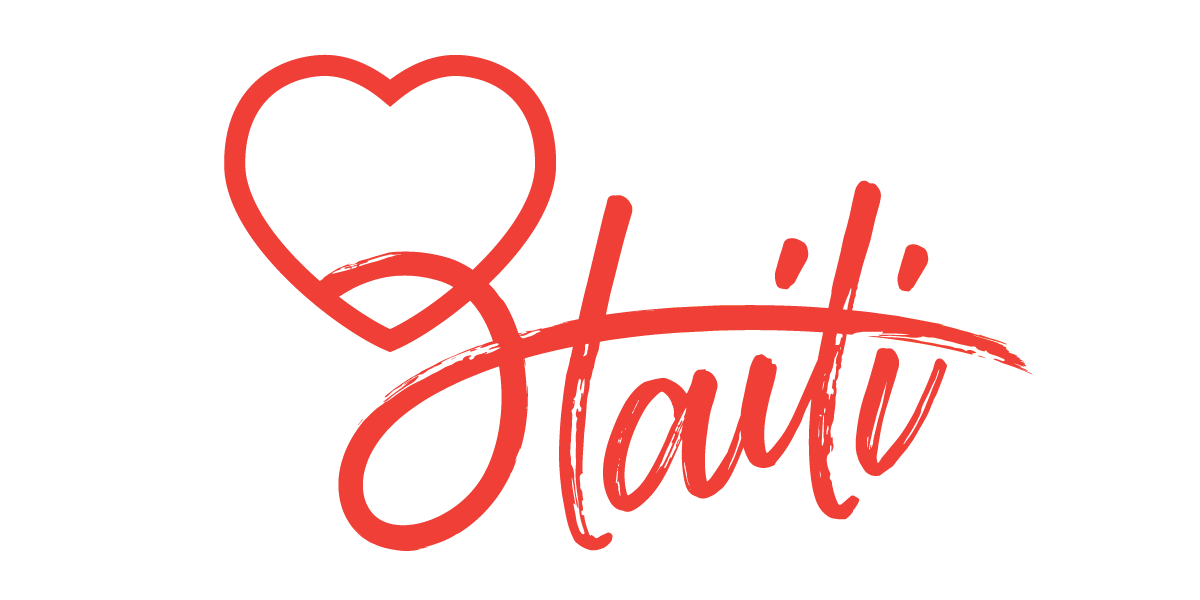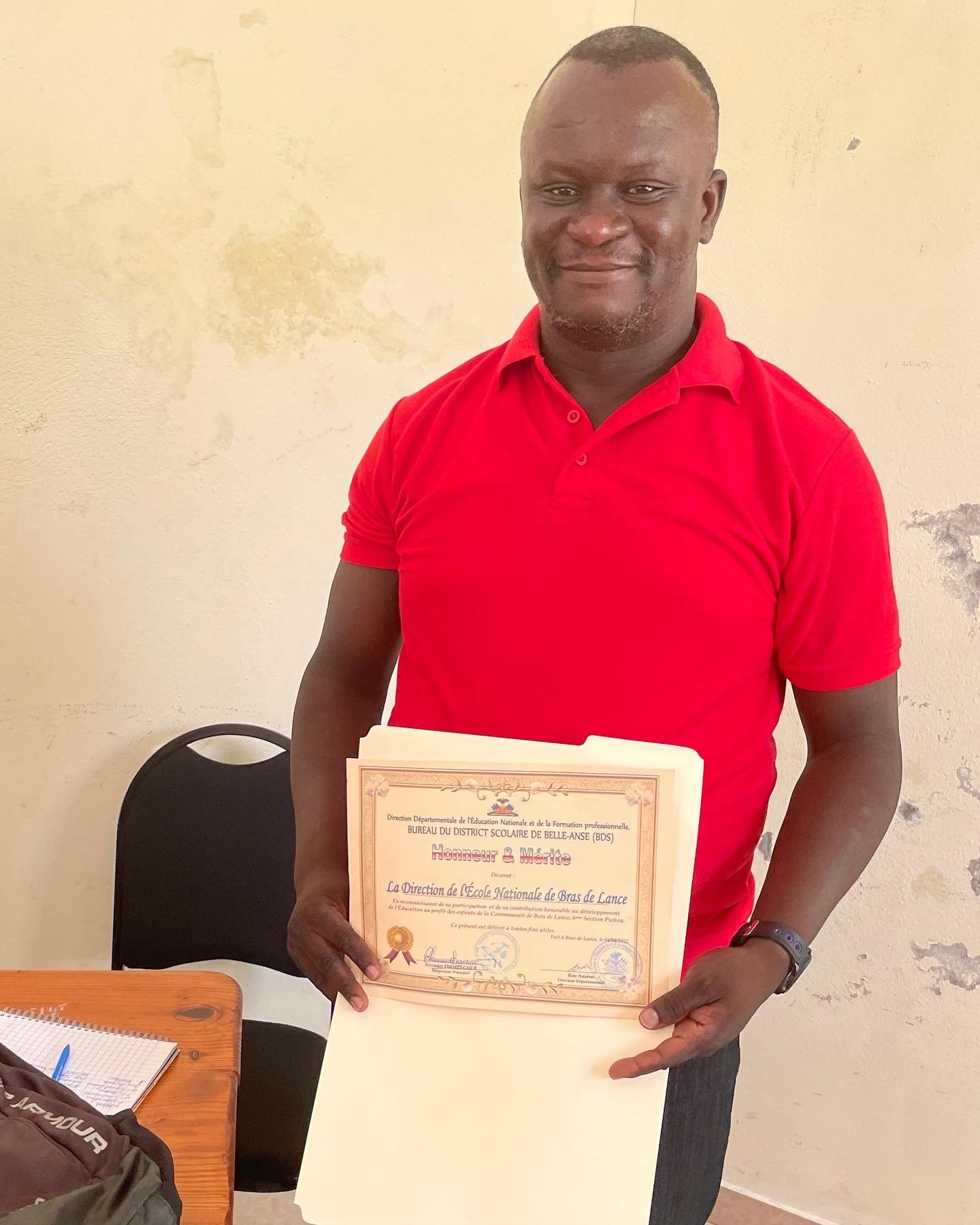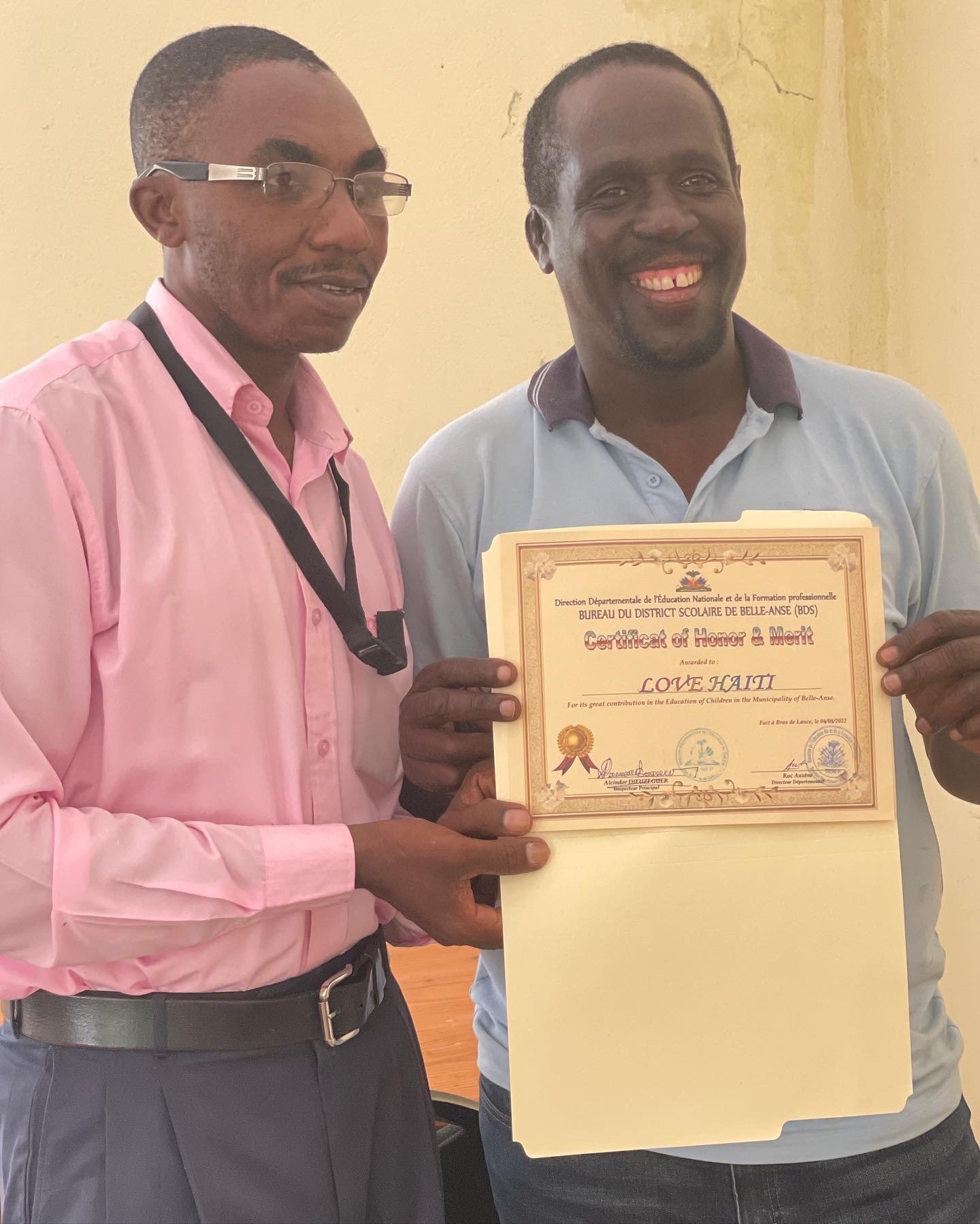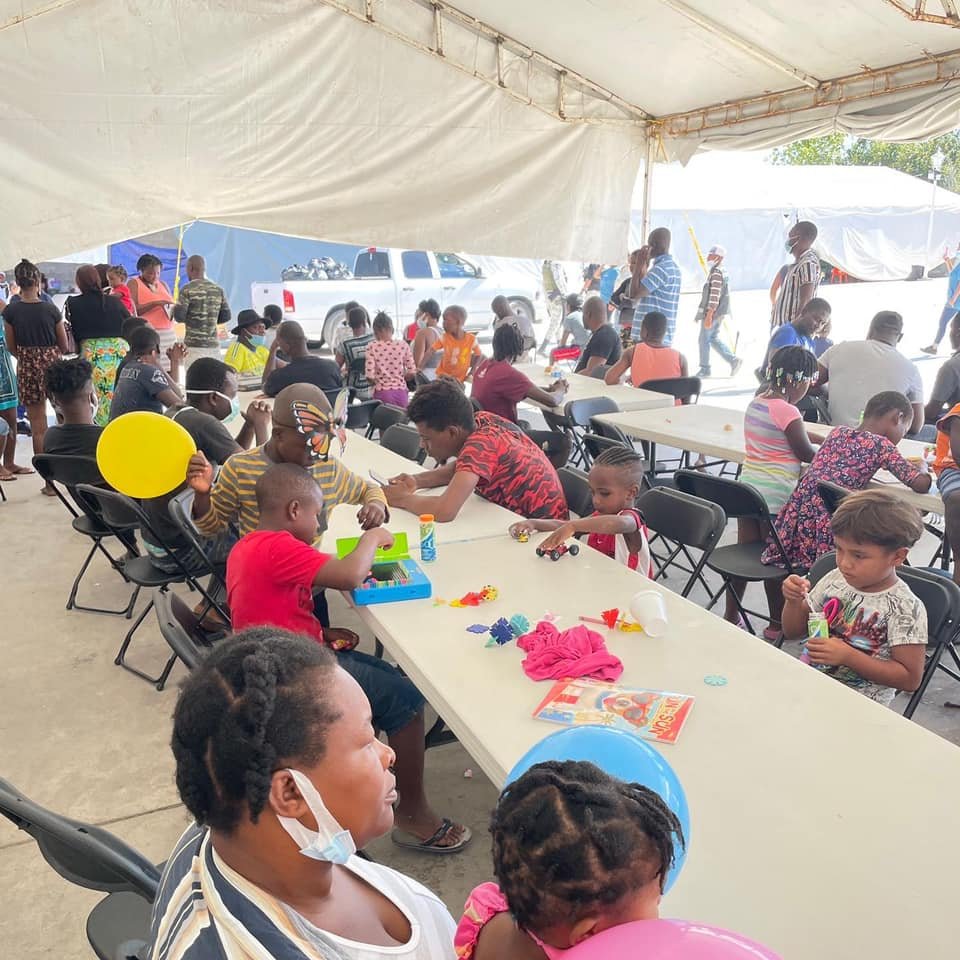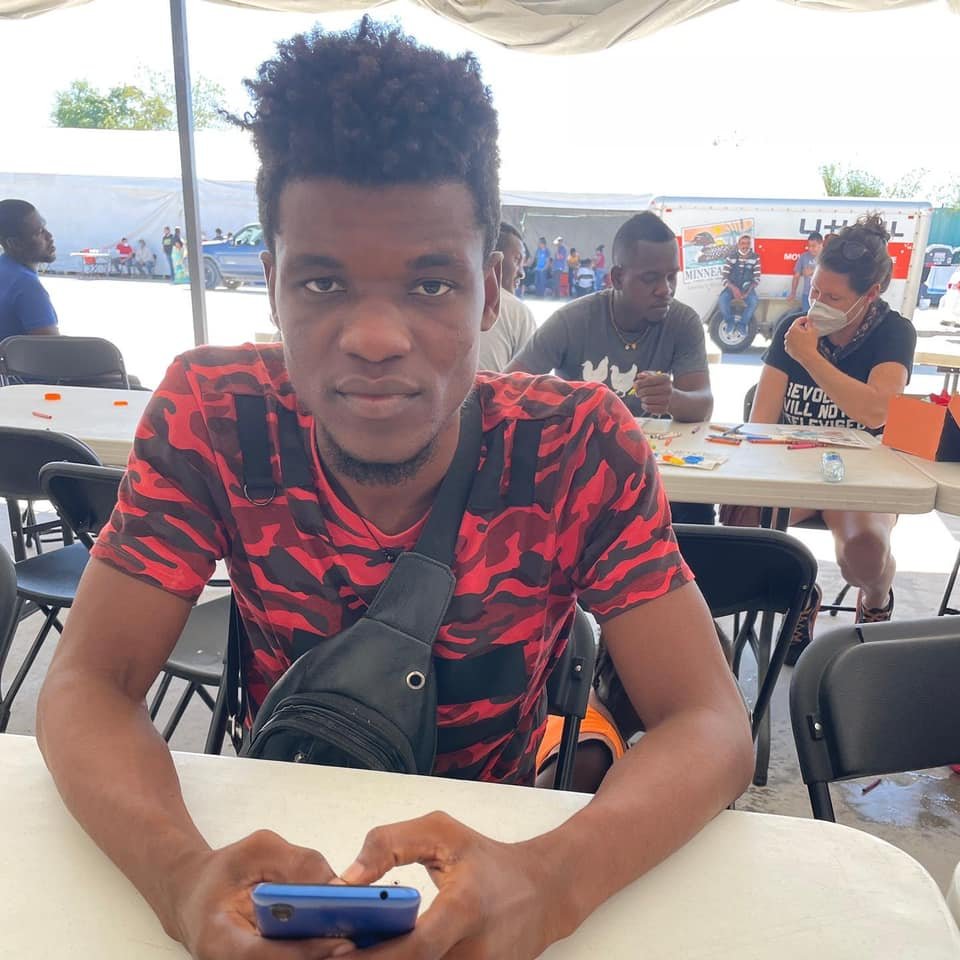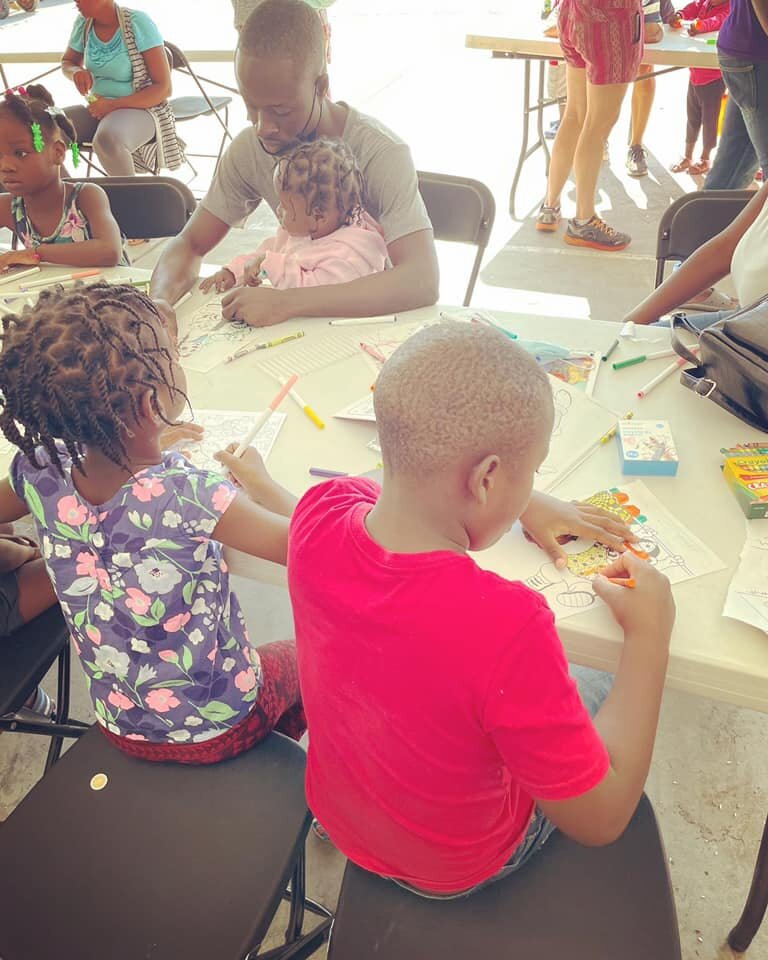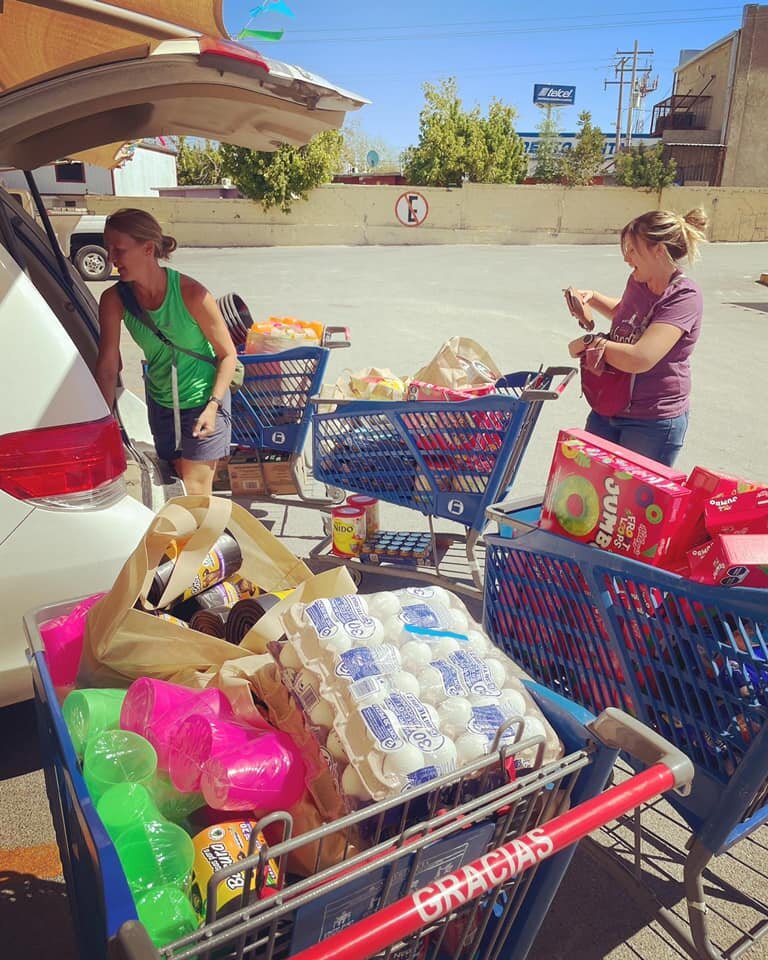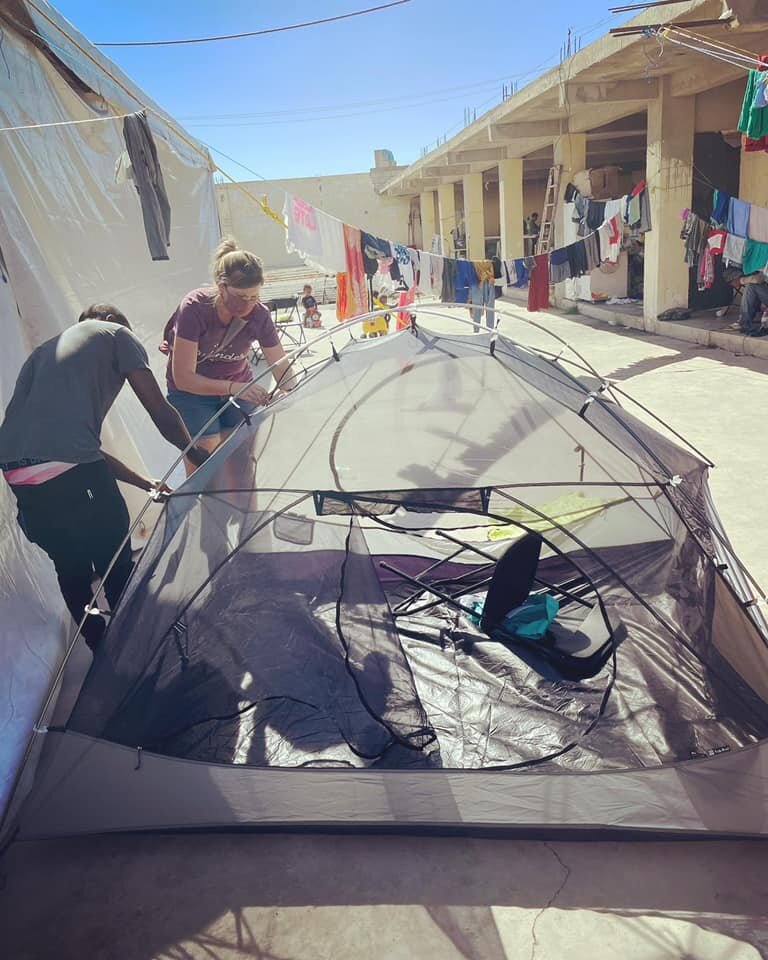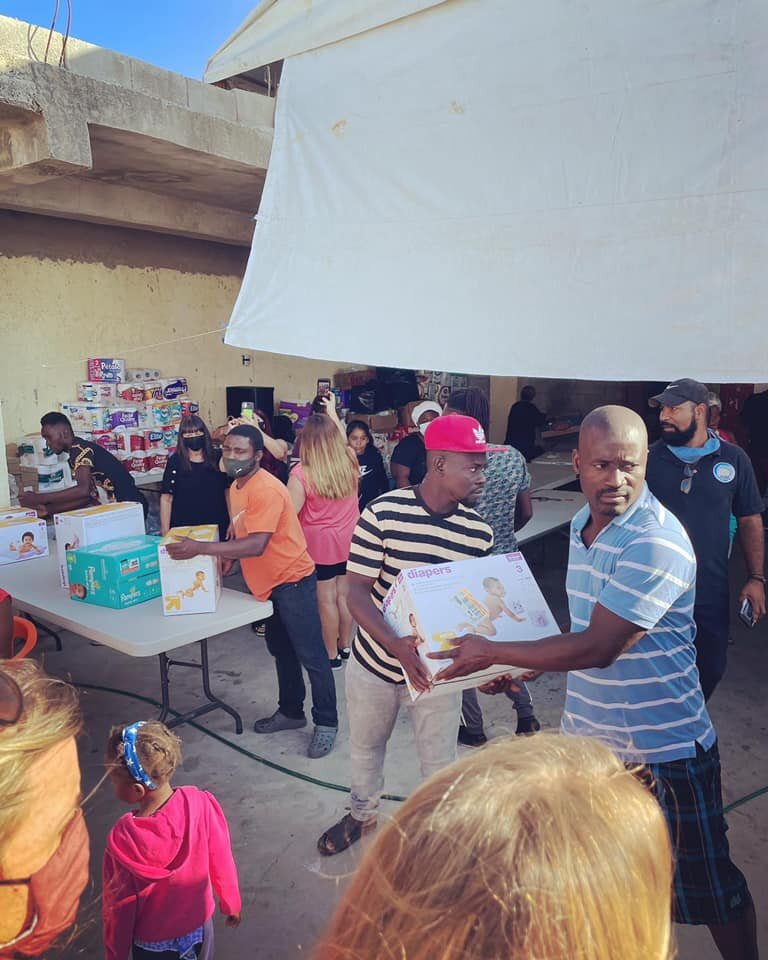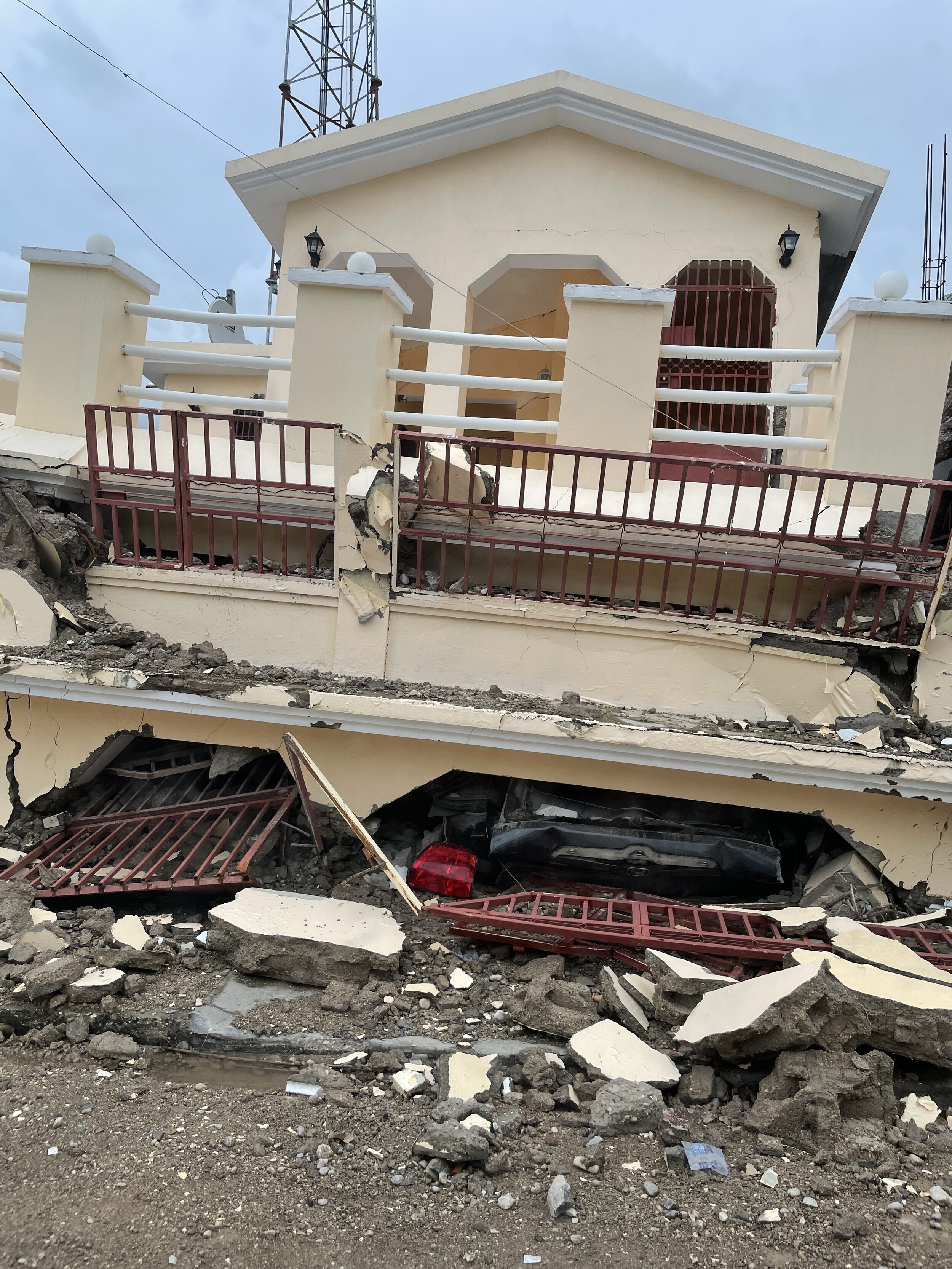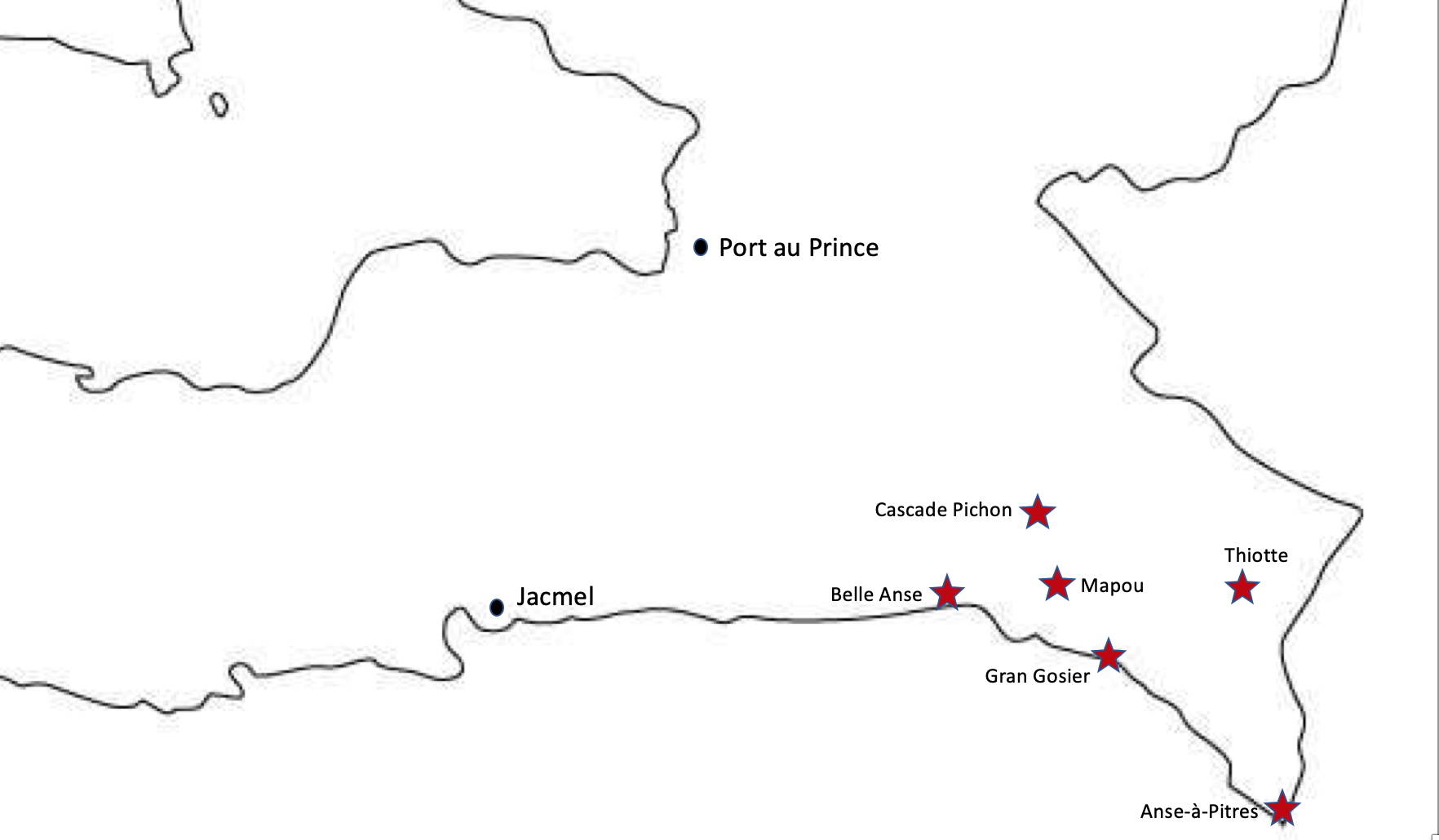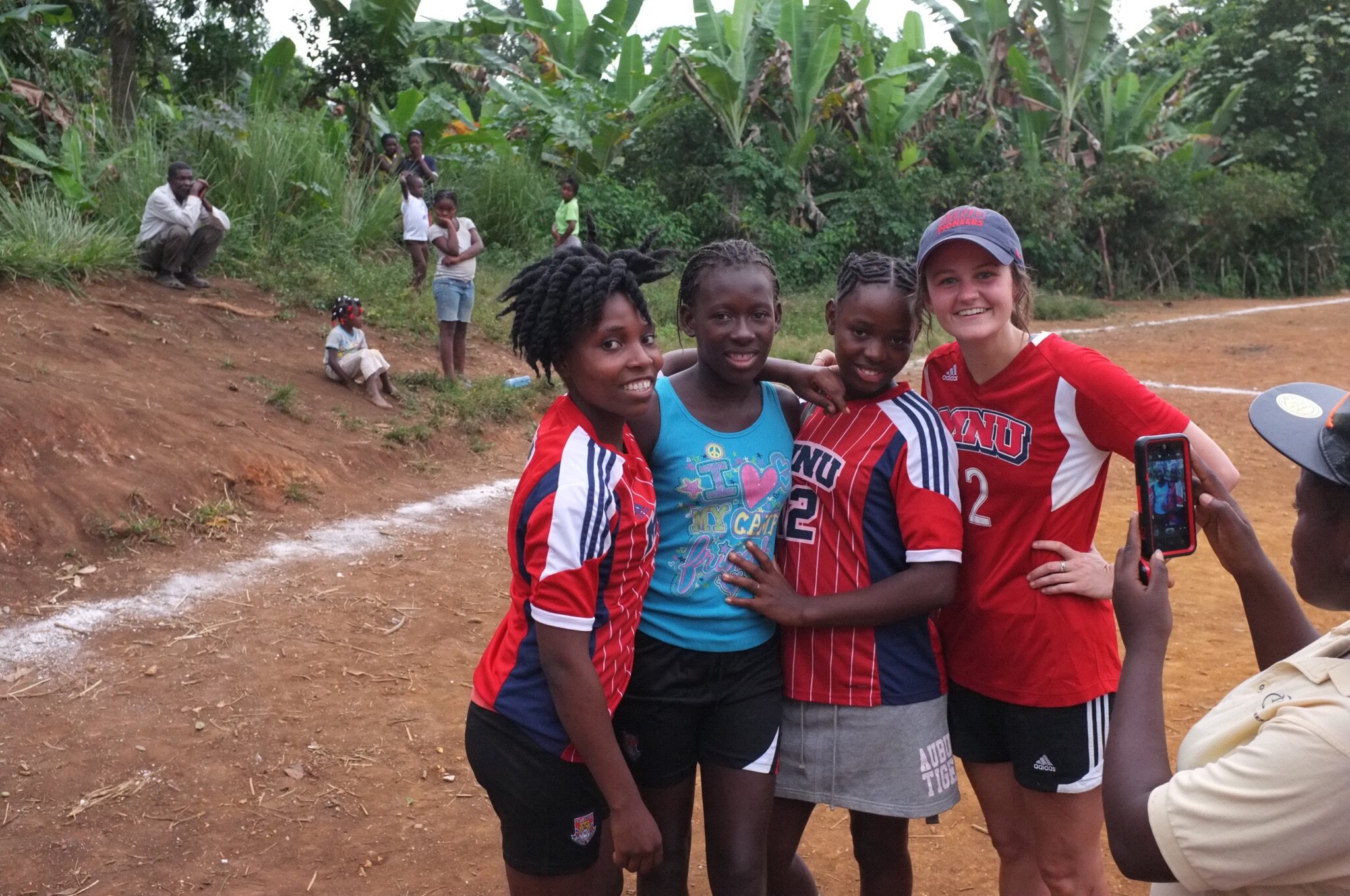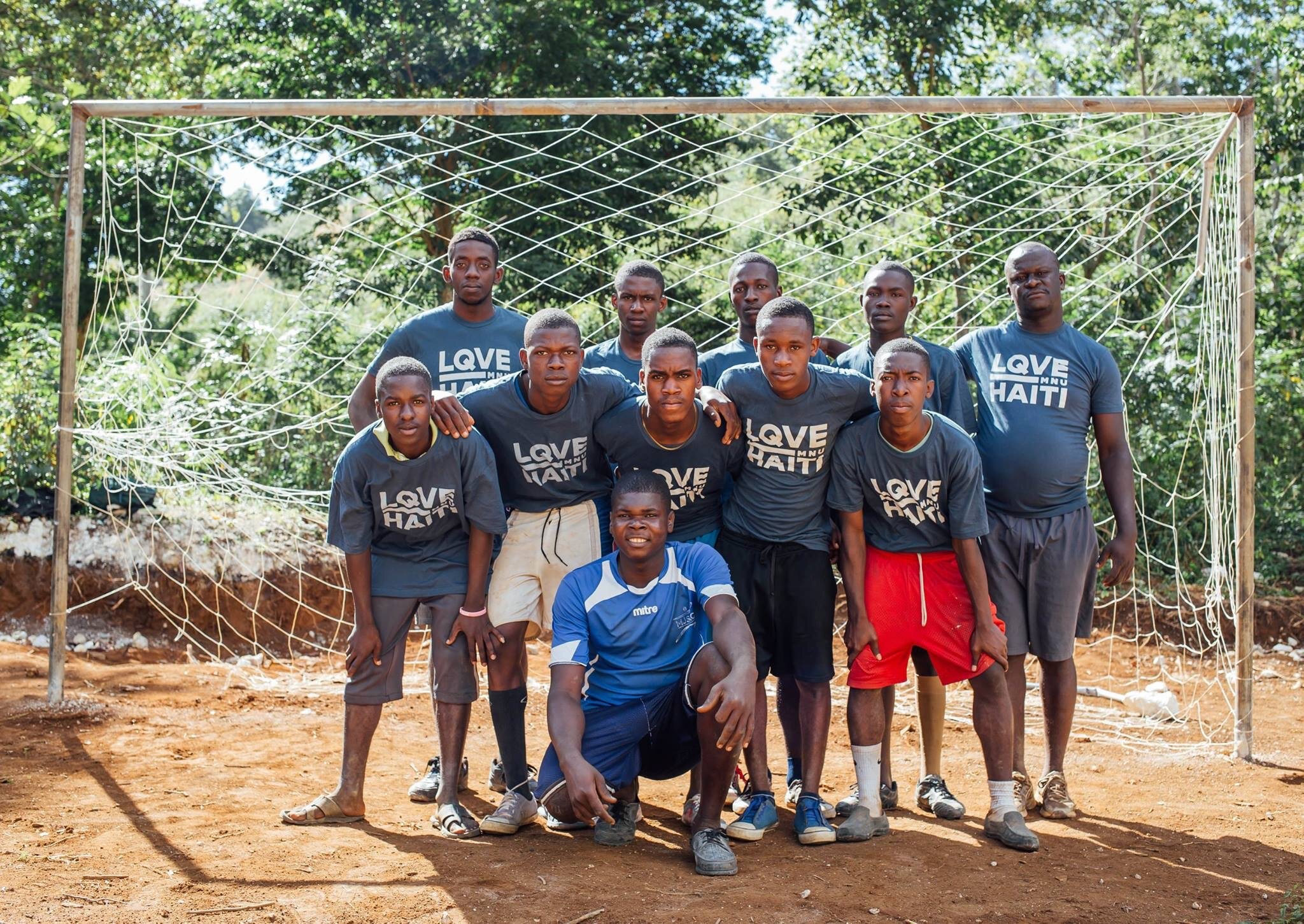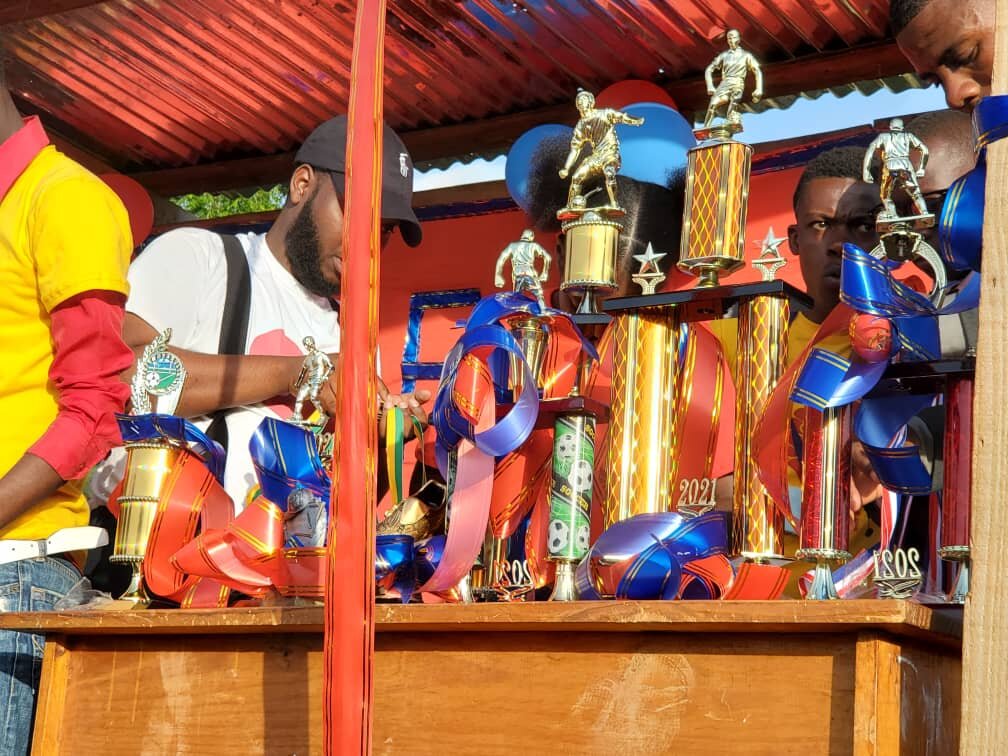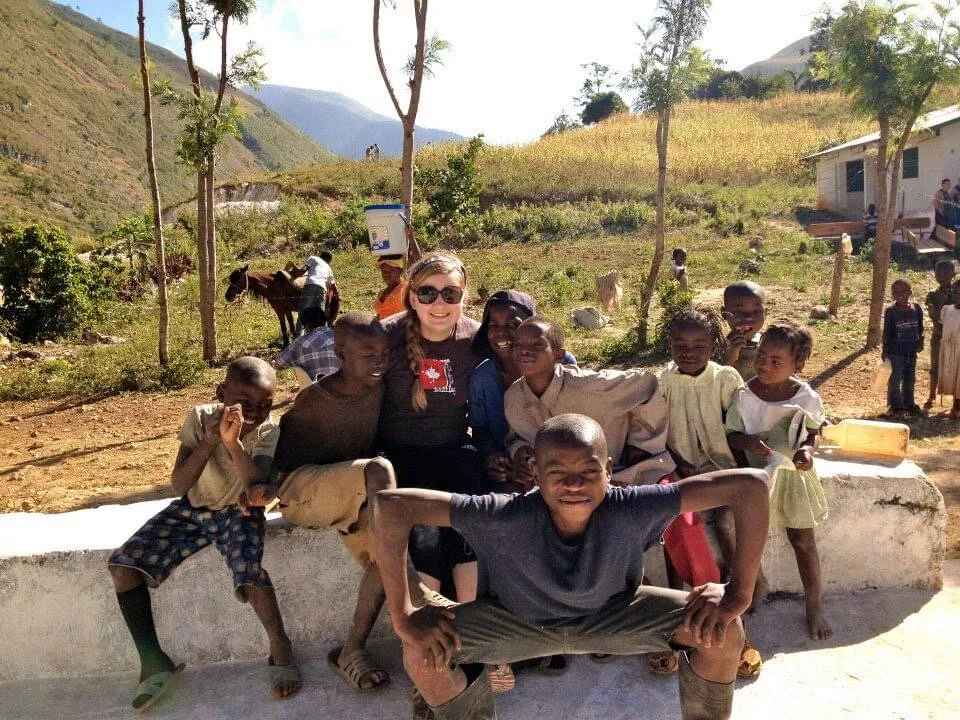Last week we felt so blessed and thankful as we were awarded a “Certificate of Honor and Merit” from the local School Superintendent in Belle-Anse for our continued work and partnership with the Cascade Pichon Community School (CPCS).
Our Director of Education, also the Principal at CPCS, was also given an award recognizing his incredible perseverance and the high-quality education he has provided for hundreds of students at this rural community school.
Come hang out with us in San Diego!
We hope to see you on June 23rd! Come for friends, food, Haitian cocktails, and to learn about how we are Helping Haitians Help Haitians! If you're not up to date with some of what we've been up to, check out our 2021 Impact Report, and feel free to invite anyone you think might be interested in the amazing work we are a part of. Blessings and love!
- Shay Foster, Co-Executive Director
⚽ We're expanding our Soccer program! ⚽
Starting this August 2022, our Soccer program is partnering with 16 elementary schools in the Pichon and Belle-Anse regions of Southeast Haiti.
Our partnership allows these K-6th graders the opportunity to compete against each other on weekends throughout the year, and compete in a tournament at the end of each semester! The School Principals we partner with love the cooperation we've curated between the schools and their respective teams, as these teams have encouraged more students to enroll in school! This helps mutually reinforce our commitments to both education and recreation for our community partners in Southeast Haiti.
(psst! We love this soccer program so much . . . and YOU could help us by sponsoring one of our 10 teams by giving $40 a month! Click here to do just that!)
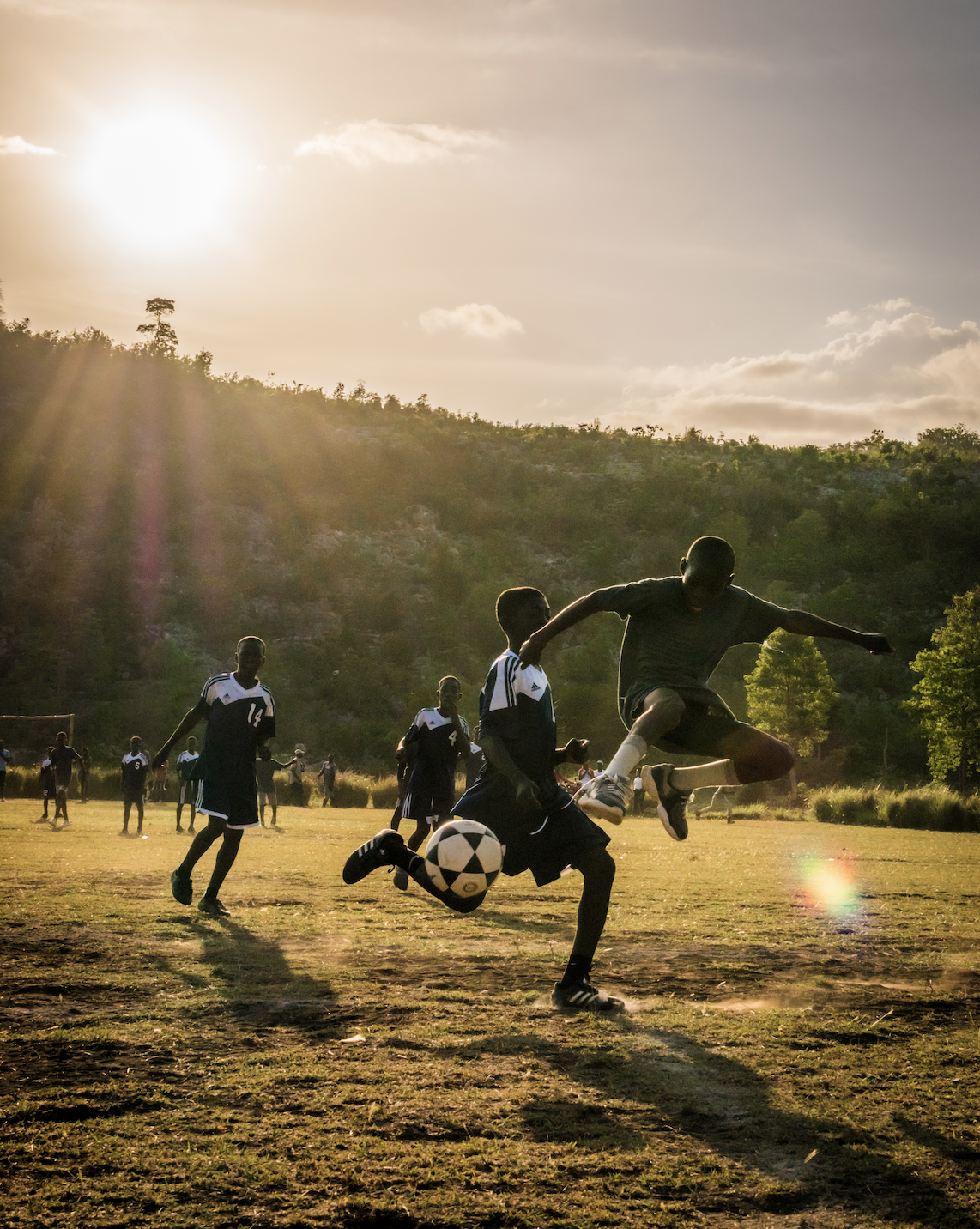
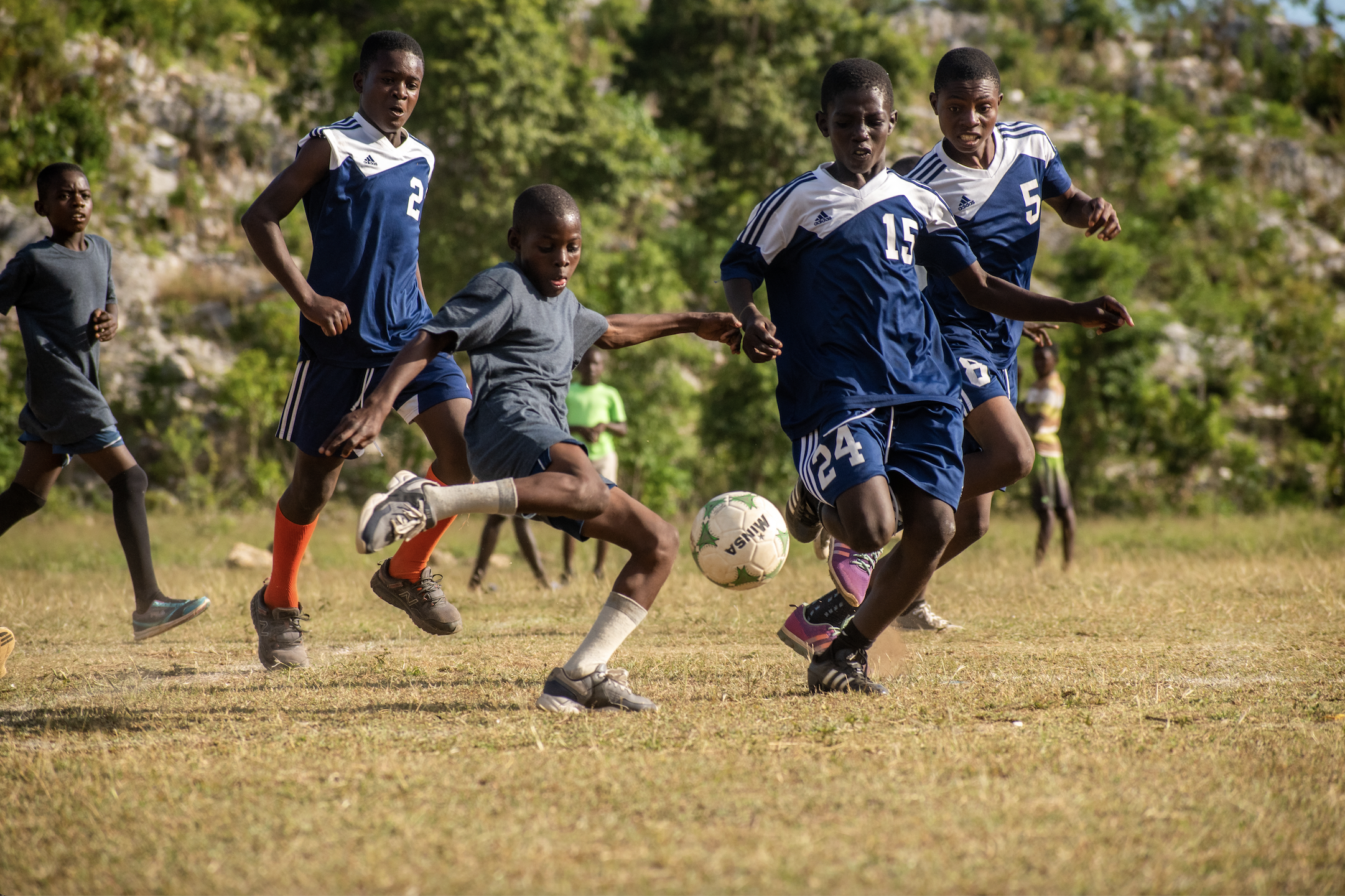
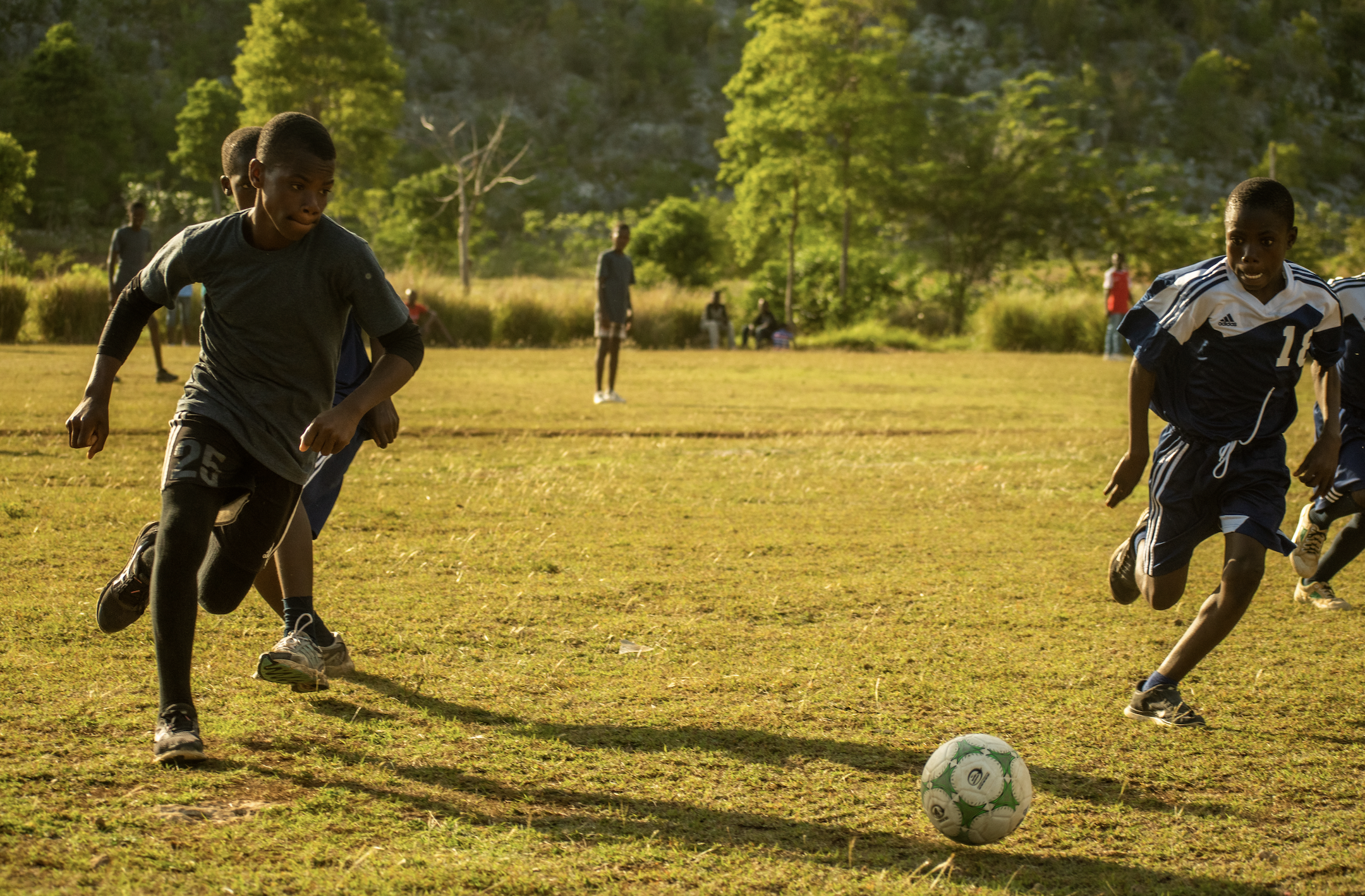
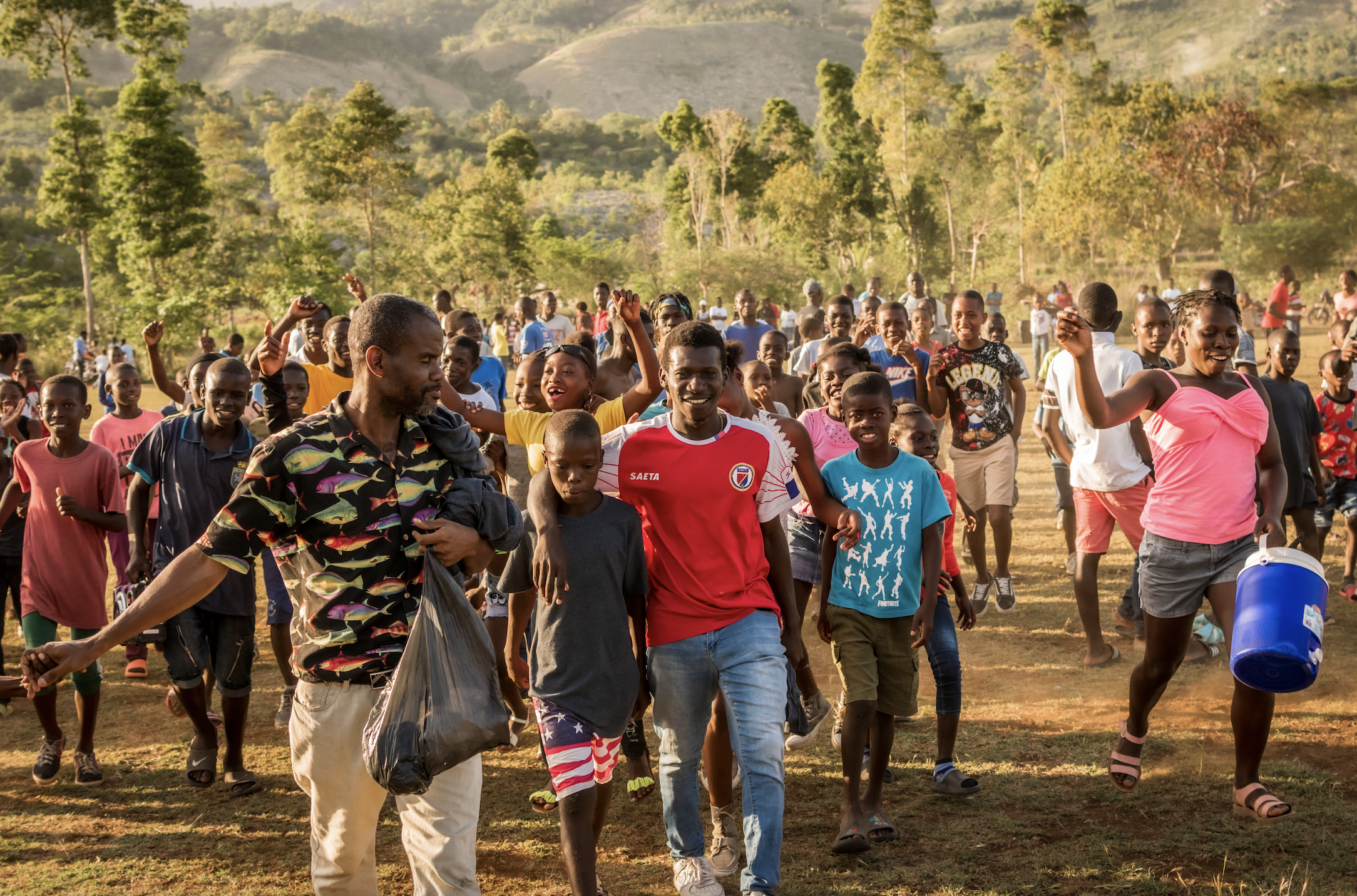
Training Locals to Identify and Respond to Future Cases of Child Malnutrition
Last week, we began training our “community health agents” in Mabriole as a part of our malnutrition project. These 10 Mabriole locals are learning from Nurse Nathalie and Dr. Bien-Aimé how to identify cases of malnutrition in the future, and at what point children should be referred to a specialist.
This training of community health agents is an integral part of our malnutrition project; focused on sustaining the health of children in Mabriole long after our program has concluded. Because of our staff and our great partnership with Heart to Heart International - Haiti, 15 children have already reached healthy status and have completed their time in this program!
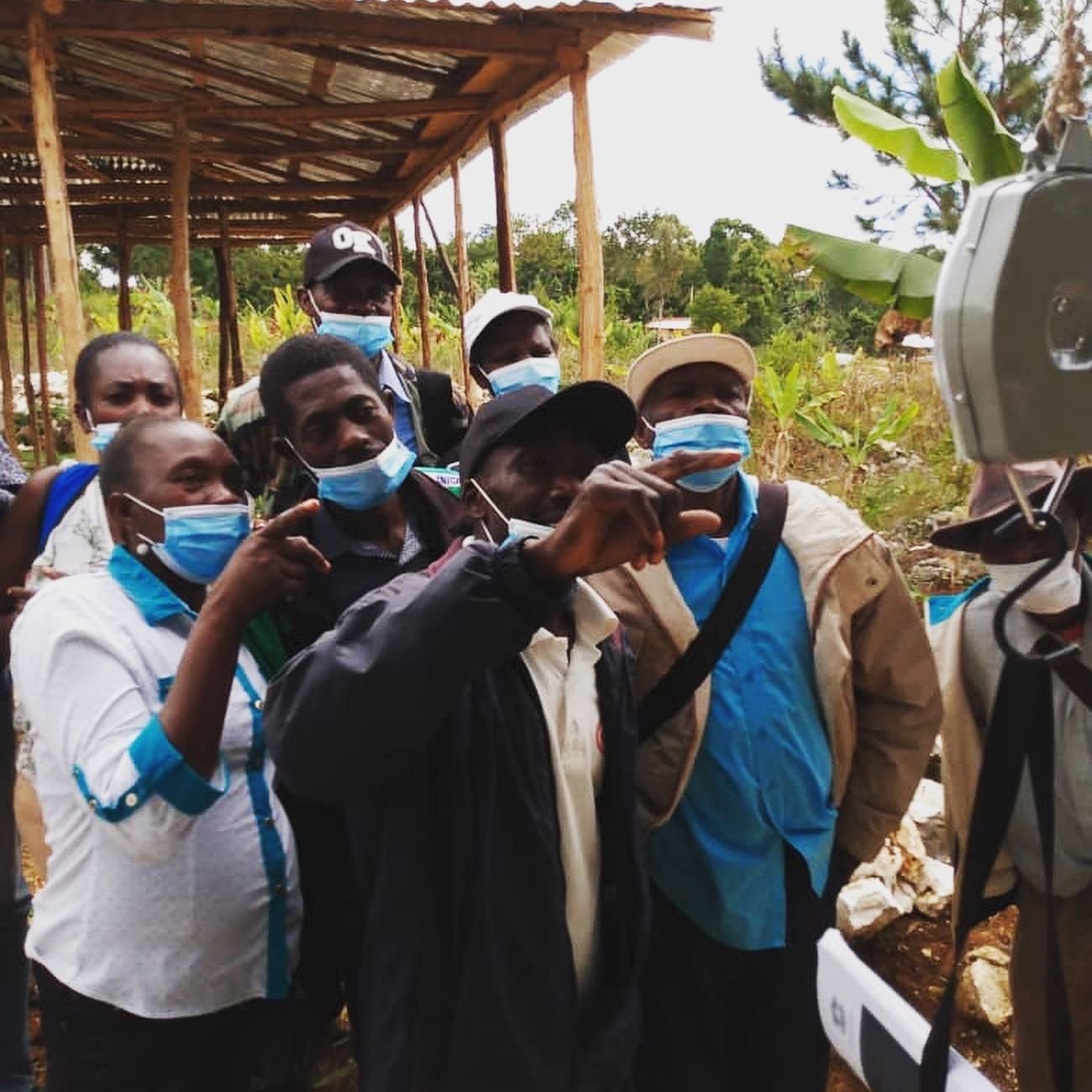
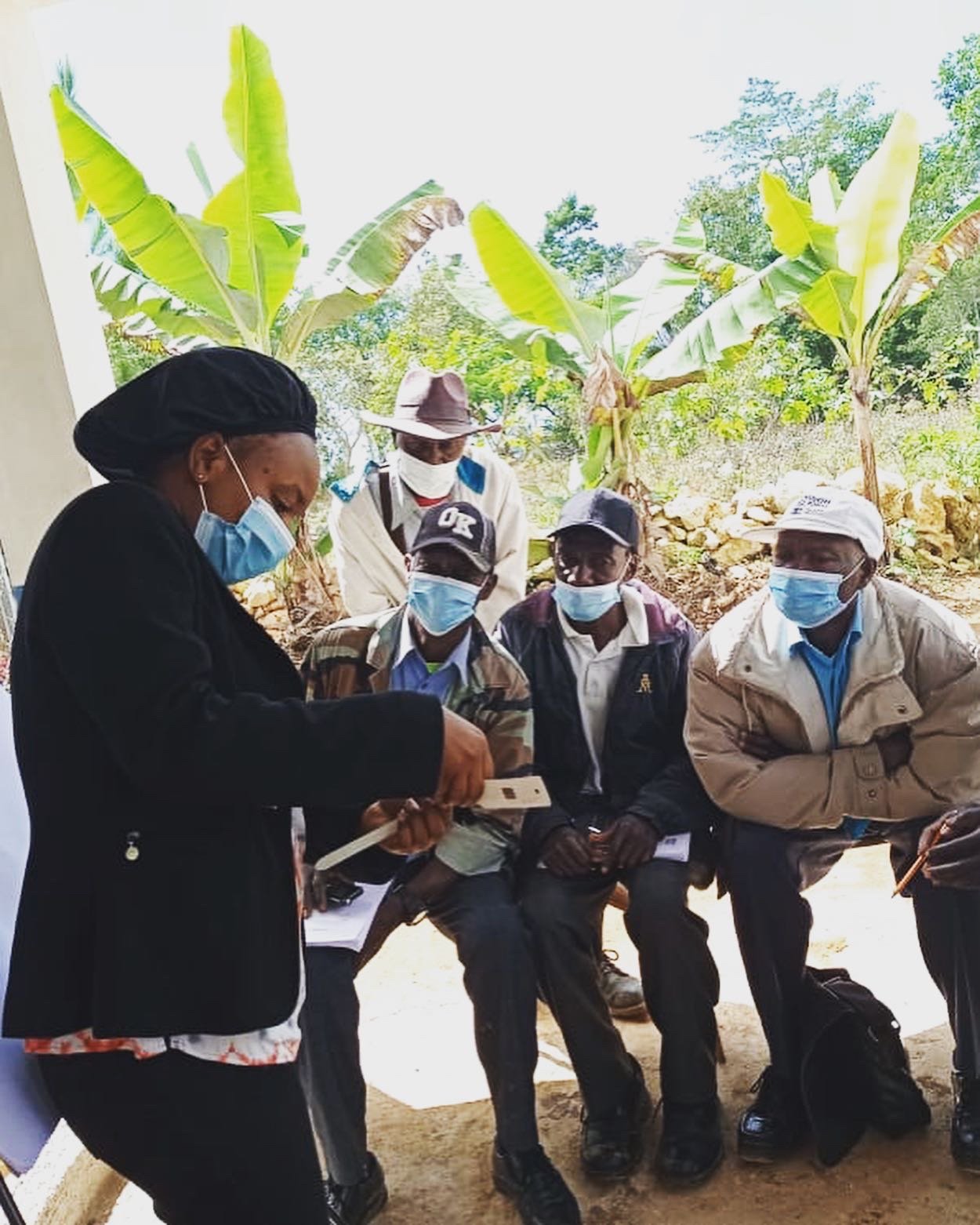
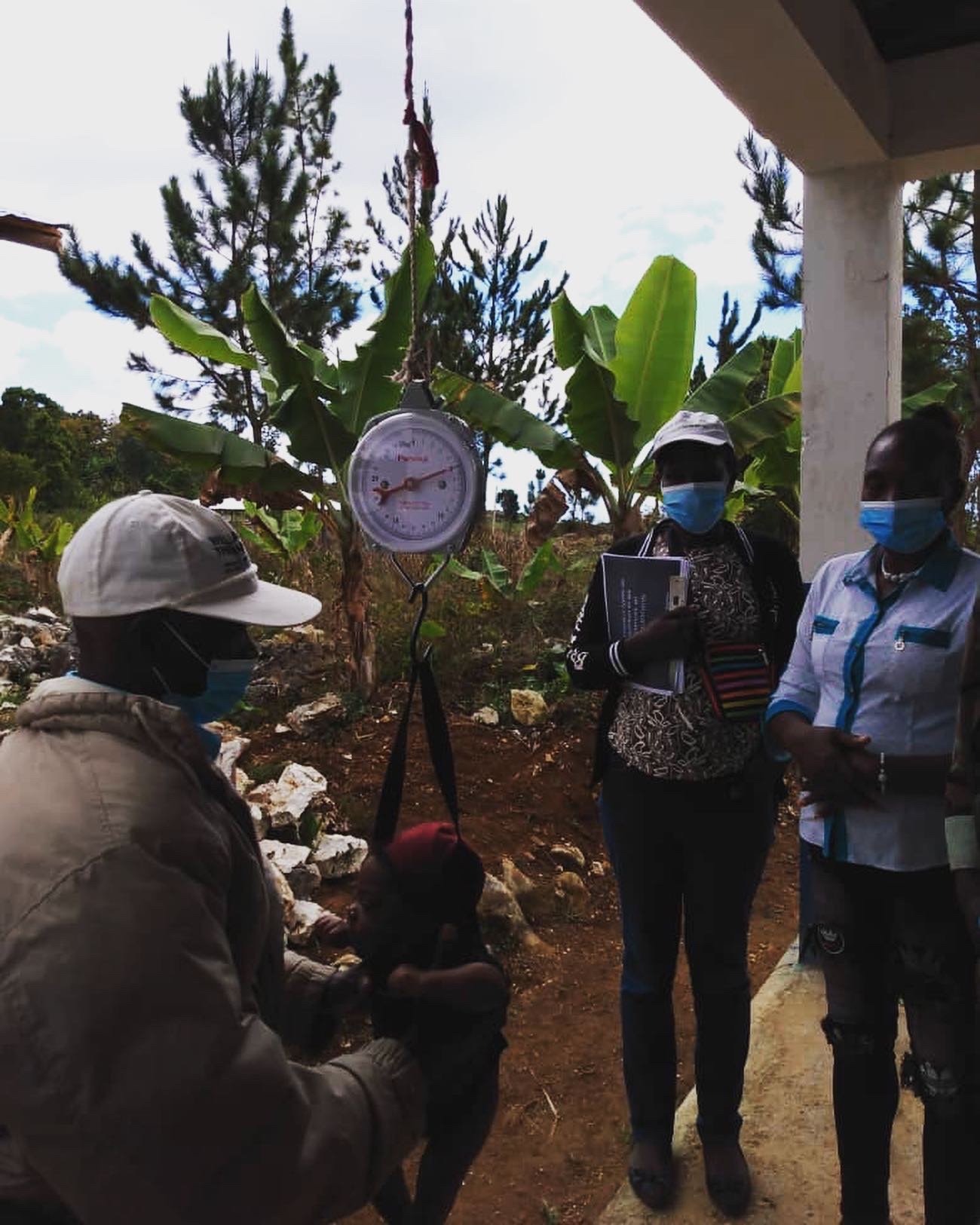
Our New Friend Noè
Last month we met our new friend Noè at a migrant shelter in Acuña, Mexico. Noè is a 25 year-old Haitian who fled Haiti in May of 2021 because of political persecution and moved with his sister to Brazil. Largely due to new anti-immigrant policies of several South American countries, Noè and his sister were soon forced to leave Brazil and decided they would try to make their way to the U.S., where some relatives of theirs are residing. They liquidated and sold everything they owned, hoping that this trip would be worth it for them in the end.
Noè and his group of Haitian migrants kept close together as they traveled through Bolivia, Peru, Ecuador, Colombia, Panama, Costa Rica, Nicaragua, Honduras, Guatemala, and Mexico (they also traveled through the “Darien gap,” perhaps the most dangerous jungle on earth connecting Panama and Colombia). One of the groups of Haitians that joined them along the way had sadly lost 8 people on the trek due to starvation and gang violence.
More than 4,000 miles and $8,000 dollars later, Noè and his sister arrived in Del Rio, Texas in late September with around 10,000 other migrants. After a brutally violent show of force from a handful of border patrol agents and dozens of deportation flights organized by the U.S. government, Noè and his sister crossed back over the Del Rio river into Acuña, Mexico for safety. There they have stayed as they await to hear if any foreign country will give them a chance at seeking asylum.
We met Noè in Acuña after all of this happened. We talked with him and he gave us permission to share his story. He and 500 other migrants were, and still are, staying in a makeshift migrant shelter there. There are 500 other stories just like Noè’s. 500 other tragedies and injustices experienced by men, women, and children at this shelter.
We don’t know how to solve macro issues like immigration reform, it’s beyond our scope as an organization. But, we know that we can help in the little places that we can. That’s why we’re going back to this migrant shelter next month; to listen to more stories from the voices of the voiceless, and to help the shelter care for these beautiful, wonderfully made people.
(side note: we absolutely understand the majority of border agents have their hands tied and are expected to enforce the current laws of their country. However, the tactics used in Del Rio by SOME of the border agents in September were reprehensible and illegal in light of international laws).
A Word on the Kidnappings in Haiti
We don’t need to tell you that we hate what is happening in Haiti right now with kidnappings, gang violence, fuel shortages, and immense insecurity. But we don’t really know what else to say, so . . . We hate it. And for the most part, we don’t know what to do about it.
What the gangs are doing in Haiti is unacceptable. And so, we pray for those who have been taken hostage. And we also pray for the kidnappers themselves. Just as these hostages are held captive by their kidnappers, so are these kidnappers held hostage by their own mindsets of violence, desperation, and lack of empathy.
We prayerfully imagine ourselves in solidarity with the millions of innocent Haitians caught in crossfires, both literal and metaphorical. But we also recognize the limitations of “prayerful imagination,” for there’s never been a people group liberated exclusively by prayer. It has always involved localized, embodied, human interaction.
We’re not leaving Haiti. Our work, friends, relationships, and mission are bigger than violence and kidnappings. Love is greater than hate. But, we can’t turn a blind eye to the realities in Haiti either.
So, we are modifying some of what we do so as to give maximum anonymity and safety to our friends, beneficiaries, and staff in Haiti. In the coming months, LQVE Haiti will be very frugal with posting or sharing any names or faces of our friends in Haiti. People who work for or receive care from non-profit organizations are often prime targets for kidnappings, and so we are going to do everything we can to keep our friends safe. We are also in the process of helping those connected with us to get out of Port au Prince and move to safety in the countryside. The overwhelming majority of the violence and insecurity is in Haitian cities right now, mainly Port au Prince. We hope our friends will be able to return to their homes someday soon in Port au Prince, but as of right now we know we cannot ask them to stay there.
We pray for the safe release of kidnapped foreigners and Haitians alike. We hold onto hope that love and peace will win in the end. We pray for God’s kingdom to come in Haiti (and the U.S). as it is is in heaven.
Amen.
An Update on the Insecurity in Haiti
As you have likely seen in the news, the insecurity situation in Haiti, specifically in Port au Prince, has been getting worse. A terribly bold new threshold was even crossed over the weekend when one of the major gangs in Port au Prince kidnapped a bus full of missionaries from the U.S., Canada, and Haiti.
We are currently in the process of trying to help our friends and partners get out of Port au Prince and move to either the countryside or another Haitian city. We are also doing our best to limit any personal information about our partners and beneficiaries online in an effort to keep them safe from kidnappers (we have even redacted information about our Haitian staff on our website for the time being).
We hope and pray that this terrible situation in Port au Prince ends soon. But until we are sure things are getting better, we want to make sure all of our friends in Haiti remain safe. While we don't work in the capital, the security situation of Port au Prince in some ways effects even our most rural partners in the Southeast. We encourage our supporters to pray with us and to look out for ways in the future to help us with moving our friends to safety.
Helping out at the Migrant Shelter in Acuña, Mexico
We’ve spent the day with Jacob’s Well KC and Youthfront KC visiting a migrant camp in Acuña, Mexico run by volunteers from Acuña. First off, we want to give praise to the volunteers and churches of Acuña for working so hard to try and help shelter and care for these migrants. It was a blessing to see a community show up where the public sector has fallen a little short.
There aren’t many words that can accurately convey what visiting this camp was like. In a certain way, these situations are even more heartbreaking than certain things we respond to in Haiti. Again, there aren’t many words.
Today we listened to migrants’ stories, helped restock camp food and supplies, and were given a tour of the camp which is currently holding about 600 people, most of them Haitian. These individuals and families have each traveled thousands of miles and spent thousands of dollars in search of a better, safer life. Unfortunately, many of them are now stuck in this situation at the border. Hopefully many of these migrants will receive legal status to work in either Mexico or the U.S. in the coming months. However, we’re not exactly sure what is going to happen. At the very least we know that we will do our best to keep supporting those in need at this migrant camp!
Helping Haitian Migrants at the Mexican-American Border
This week we are headed down to Cuidad Acuña, Mexico with YouthfrontKC and Jacobs Well KC to offer our assistance to the many homeless Haitian migrants at the Mexican-American border. We will be visiting migrant shelters, listening to migrants' stories, and distributing much-needed supplies to those in need including tents, cots, soap, diapers, and games for kids. Our group was recently connected with representatives from the United Nations High Council for Refugees (UNHCR); we will also be helping UNHCR however we can for their relief efforts.
We are still looking for donations to help us buy more materials for these people in need! Many of the items they need cannot be found in Cuidad Acuña right now, so we have to purchase and bring them ourselves. If you feel led to give to help out our brothers and sisters at the border, 100% of every donation will go straight to providing them with needed resources and services.
Haitian Educators Choosing Their Donors
We recently kicked off the school year at Cascade Pichon Community School (CPCS)! Because of a lack of government funding, the school was going to have to close its doors if they couldn’t find other financial support for the 2021-2022 school year. Luckily, we had 8 donors step up and “adopt a classroom” for the year so we could help them keep every classroom open!
Rather than having our donors choose who they wanted to support, we had the teachers at CPCS choose which donor THEY wanted to support their classroom. They were all presented with a picture and bio of each donor, and each teacher chose the donor they wanted to partner with.
Here you can see Yvona. Yvona teaches kindergarten and chose our friends Megan and Javon to be her supporters for the school year!
Healing Voudou Ailments Through Haitian Healthcare
We recently talked with Nurse Maryse and she told us this incredible story about a patient in her clinic in Cascade Pichon!
“So I recently had a sick patient who came to me. She felt awful and thought that she was trapped in some sort of Voudou activity. She was very worried because she thought that someone was trying to put a spell on her. I told her, “I actually think that you have some sort of medical problem - it’s not anything related to the devil. I think it’s some sort of health issue.” The patient was persistent that she was afflicted by some sort of Voudou activity, so I just suggested to her that we give her a glucometer test to check her blood sugar. She initially refused the test, but one day she came back to the clinic and wanted to do the test.
We found out that her blood sugar was 508, and I told her “the devil is the sugar in your blood.” So I started giving her some information on diabetes and some meds as well. She then came back a couple of days later and her blood sugar was 160 which is a good thing. This is just one of the many stories that happen frequently in my clinics.”
Concluding Our Earthquake Response
And just like that, a month after a 7.2 magnitude earthquake rocked Haiti’s western peninsula, the Response Team wrapped up their last mobile clinic at the end of last week.
While it’s always a strange feeling to intentionally stop a project like this, part of disaster response is knowing when to pull back and conclude the short-term relief efforts. For us, that time has come! Considering that LQVE Haiti is not a disaster response organization, and that we typically focus our work in areas that were unaffected by the earthquake, we’re very proud of the response we were able to help our Haitian friends pull together.
This small group of 5 Haitian medical professionals attended to more than 600 patients during the 3 weeks after the earthquake. That’s pretty incredible if you think about it.
While we have concluded our earthquake response, if you would like to continue to support relief and rehabilitation efforts that are ongoing in the many affected communities - we invite you to give/get plugged into one of these organizations that we have come to respect and love over the years!
Little Footprints, Big Steps and Konbit Haiti are helping families rebuild their homes and rehabilitate their communities in the earthquake zone.
And
Doctors Without Borders and Heart to Heart International are continuing to see patients in affected communities.
Thank you to all who gave for our earthquake response initiative!! We’re anxious to see Haitians rebuild their communities and are excited to keep sharing our mission with you!
https://littlefootprintsbigsteps.com/
Empowering Haitian Educators
This next school year, we will be directly partnering with the Cascade Pichon Community School (CPCS) in Cascade Pichon, Haiti! This partnership was initiated by the school’s Principal and Teachers who have worked at CPCS for years - it is a grassroots collaboration that we are thrilled to be a part of for the 2021-2022 school year!
Earthquake Update: Supporting the Jackenson Response Team
Over the last several days we have been supporting the efforts of the Jackenson Response Team (JRT), a group of Haitian medical professionals led by Dr. Jackenson Davilmar (M.D.) responding to and caring for injured Haitians in the aftermath of the 7.2 magnitude earthquake that struck Haiti last week. Collaborating with local authorities and other NGOs, the team was connected with several communities that hadn't seen medical care yet.
In fact, the more we talked with people further and further from the city center of Les Cayes, the more we realized that there are many small communities in the mountains North of Les Cayes that also haven’t seen any medical care! As a response to that and the Haitian Government’s State of Emergency Declaration, we’ve decided to keep supporting the Jackenson Response Team beyond our initial plan 3-day plan. We now will be supporting this medical team and helping them visit these unreached communities over the next 2 weeks!
Crossing broken bridges, driving through rivers, moving literal trees out of the roadway, and ignoring half a dozen earthquake aftershocks - this team cared for 158 patients in their mobile clinics over the last 2 days . . . But they’re not done yet! LQVE Haiti will not be orchestrating how the clinics are run or anything like that, we are simply partnering with the JRT in an effort to enable them to do this life-saving work they are all qualified to do. We are operating as a financial and logistical conduit so that the JRT can be as effective as possible. Because of this partnership, we will have several more expenses in the coming weeks, including medical supplies, stipends for food, and modest payments for these healthcare providers. But of course, all of this is worth it because we know that this is who we need to be supporting right now!
Update on Earthquake in Haiti
So far, Haiti has identified over 700 casualties and more than 2,800 injuries in the aftermath of the earthquake in the surrounding regions.
We are arriving in Haiti tomorrow morning and planning on partnering with another NGO/local group suited for disaster relief work. We are NOT a disaster relief organization, we are a community development organization. Thus, we are not well equipped to help with something like this on our own - but we still believe there are ways we can help Haitians help Haitians even in this terrible situation.
We will keep you updated as we begin to engage with the surrounding communities affected by this disaster. If you would like to give to help offset our costs for this trip, we gladly welcome that.
Supporting Womens' Soccer in Haiti
“Playing soccer is something that I love to do a lot. Whenever I see people playing, I immediately have the urge to play. That’s why I chose to play for this team. I was not in town when I heard about the tournament, but since I like to play soccer, I came to town just to play and have fun with the community. Bringing together competition for girls’ teams is such a good thing and I like that a lot.”
- Vanessa Pandole, #19 Left Wing for Jeunesse Sportive de Thiotte
It's soccer time!
This past weekend we kicked off the first games of our 5th Annual Southeast Soccer Tournament! This event is so cool because of how many communities have signed on to participate year after year and how it allows neighboring communities to come together in the name of friendly competition to play on one another's home fields. 8 Boys' and Girls' teams from across these communities will be competing from July 30 - August 7 for the championship trophy.
Shay Broke His Leg In Haiti
I (Shay) broke my leg hiking in Haiti.
I was in Haiti two weeks ago visiting our friends in the Southeast with Frantz. This was my first time personally visiting the remote community of Baguette that Frantz had befriended months prior. One of my favorite things about what we do at LQVE Haiti is that we’re committed to making friends in the hard-to-reach places of Haiti. Like, the really hard to reach places of Haiti, ha! We know of other NGOs that have literally said “never bring us back here” when they have visited some of the remote places we call home in the Southeast. Between the lack of legitimate roads and the mountainous terrain inherent to southeast Haiti, it’s understandable why not many people are making trips to these communities! (Also: no disrespect at all to those organizations that decide to work in the cities and easier to access places in Haiti, that work is desperately needed too!)
You can’t use a car to get to Baguette. No road reaches this little peninsula community 10 miles southwest off the coast of Jacmel. To get to Baguette, you need a boat. So one of the days I was in Haiti last month, Frantz and I climbed into a small motorboat on the shore of Jacmel to go to Baguette. The motorboat was owned and operated by Anne Marie, a kind, middle-aged woman who is a resident of Baguette and a member of the community’s development committee. After the 30-minute boat ride through mildly choppy waters, we arrived at the beautiful little mountain-beach community. I thought we had arrived at our final destination as I stepped out of the boat. But, it turns out we were about to hike up the mountain to see the spring where the community has historically had to go to get their water for years. To cut it short: I was not prepared for that hike.
Getting up to the spring took an hour of intense, continuous hiking with a steep incline the whole way. While it was fun to make jokes about how out of shape I was with some new Haitian friends hiking with us, I was fairly dehydrated by the time we reached the top of the mountain. Out of breath at the top of the mountain, I looked at the spring where a couple of young boys were washing off and realized how ridiculous it is that people here have to make this hike every day just to get water. After checking out the spring, we turned and headed back down to the lower part of the community, where we were meeting with community residents to talk about the water project. Hiking down was much easier than hiking up. That is, until 40 minutes into the hike back down when I slipped on some loose rocks, fell on my leg, and broke my fibula.
After saying some expletives that hopefully were lost in translation for some of my new Haitian friends, I was able to stand up and limp back down the mountain with the help of my new friends (and a walking stick someone fashioned for me from a tree branch). After thirty minutes of what should have been a 5-minute walk, we finally arrived to the bottom of the mountain where the community was waiting. All of us exchanged facial expressions ranging from pity to comic relief as we sat down and discussed what we wanted this water project to look like.
I wouldn’t find out I broke my leg until I got back to the states. But after that incident, I was limping around Haiti for a couple of days, constantly thinking to myself: “How ridiculous is it that I, a single foreigner visiting this community for the first time, can’t make the journey that they make every day to get water one time without getting both dehydrated and hurting my leg in the process?” The irony was not lost on me. The whole experience made the project and the community’s idea for the project all the more valid; reemphasizing what Frantz said weeks ago, “the current situation for getting clean water in Baguette is ridiculous.”
I half-jokingly told the community during our meeting that I would “use my injury to try and paint a picture for my friends back home of how hard it is to get water in Baguette.” And so that’s what I’m doing in this post! I hope this story gives you a taste of the work we are doing in Haiti and where we choose to do that work. Amidst a troubling and almost impossible security situation in Haiti, we are in the process of launching phase 2 of the Baguette Water Project (which includes installing pipes and pouring concrete). Your thoughts, prayers, and support are invaluable assets to us when we enter into this work with Haitian communities!
side-note: for those wondering, my leg should be all healed up in another 2-4 weeks
Happy Birthday Q
Happy birthday to Quincy, the original inspiration behind the work, friendships, and name of LQVE Haiti.
We don’t always talk about Quincy and our origin story - but today, we wanted to wish her a happy 27th birthday. Quincy went to Southeast Haiti in 2012 and made friendships and connections that we are still in contact with to this day. To honor her life after her sudden and tragic death on New Years Day 2015, a group of Quincy’s friends and family went to Haiti in June of 2015. Those trips then exploded into a network of friendships and Haitian dreams that is today LQVE Haiti. Of course, none of it could have ever started without Quincy’s trip to Haiti and her subsequent commitment to go back someday.
Happy 27th Q, we miss you. Bòn fèt sè dous mwen.
Shay and Frantz Come On Full-time for LQVE Haiti
A big announcement in the life of LQVE! After doing some extensive fundraising on the side for their administrative costs, Shay Foster and Frantz Lojeune are coming on board full-time for the LQVE Haiti team. Shay is coming on as our Executive Director and we are contracting Frantz to be our Logistics Coordinator on the ground in Haiti. In this big step in the life of LQVE Haiti, we're excited to scale up in size a little in order to continue to help Haitians help Haitians.
